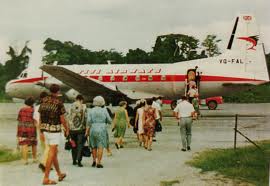
Air Pacific has reached into its past to define its future with the decision to re-brand itself as Fiji Airways more than 40-years after it jettisoned the name. The airline’s new flagship aircraft –three Airbus A330-200s – will be emblazoned with the back-to-the-future moniker when they begin operating across the network in just over a year. The state-of-the art A330 will be the first Fiji Airways aircraft to carry the name since 1971, when the airline’s Hawker Siddeley 748 turbo-props were painted over with the Air Pacific “Flying Fish” livery.
Only Fijians approaching their own half-century will be able to recall a Fiji Airways plane lumbering across island skies. So why go back to it? Why abandon an established brand as familiar in the skies over Hong Kong as it is over Sydney and Los Angeles? According to the airline, the switch has come only after months of exhaustive market research, including the use of focus groups. And the main reason is the strength of Brand Fiji – the appeal of that nice four-letter word starting with F for consumers around the world.
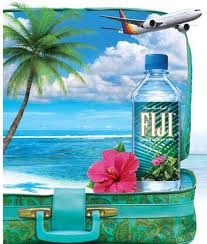
The hope is that Fiji Airways will soon join Fiji Water as an iconic global brand, instantly recognisable and unambiguously from the Fiji Islands rather than some generic Pacific destination, as the present name implies. Forty years ago – strangely enough – Fiji Airways seemed rather parochial and the name Air Pacific was embraced with alacrity. It was the symbol of a new era of regional cooperation – “strength in unity” – that marked the end of the colonial age. Up to seven regional governments became shareholders and four – Kiribati, Tonga, Nauru and Samoa – retain small holdings. But some of these eventually wanted airlines of their own – most of which failed – and the Fiji Government was left as Air Pacific’s dominant shareholder. It strongly supports the airline’s American CEO, Dave Pflieger, in his comprehensive overhaul of the airline’s operations to remain competitive. This includes buying the three new fuel-efficient Airbuses to replace two leased gas- guzzling 747s. Plus, of course, the name change. So Fiji Airways it is.
But is it a good idea to name an airline after a country with a record of instability? Some industry observers wonder. Fiji was “the way the world should be” before 1987 and the first of four coups that its political class, in particular, is still trying to work through. Yet for all the country’s vicissitudes, its international image has been remarkably resilient, not least because those who visit Fiji invariably find that politics doesn’t get in the way of a good time. To say that Fiji is uncommonly “friendly” is so much a part of the country’s branding that it’s now something of a cliché. But the high level of repeat business it gets speaks of something more – genuine bonds of affection forged between its visitors and the locals, sometimes over many years. That bond is so resilient in the case of Australians and New Zealanders that tens of thousands of them ignore their government’s coup-related sanctions against Fiji and keep coming in record numbers.
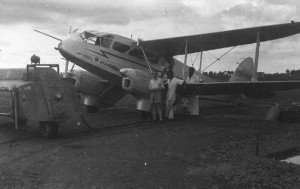
These are what the tourism boffins describe as “mature markets” – extremely valuable but with relatively limited scope for growth. The name change to Fiji Airways is based on research that shows many potential fliers don’t necessarily link Air Pacific with Fiji – seeing it more as a generic regional entity. The name “Fiji” might be on the tail of existing aircraft but it’s not in the schedules and – as the research tells it – not lodged firmly enough in the minds of the wider traveling public who Dave Pflieger and his team desperately want to attract to stay afloat.
Like many smaller airlines the world over, Air Pacific is under intense market pressure, especially against its cut-throat competitors on the Australian route – Jetstar and Virgin. Jetstar’s presence has been especially irksome, for it’s the low-cost offshoot of Air Pacific’s minority shareholder, Qantas. Time was when Qantas was willing to pull its own aircraft out of Fiji and put its passengers on code-shared Air Pacific flights. It still does. But then –perversely – it sent in Jetstar to compete against Air Pacific – a full service airline it partly owns. Now a Qantas frequent flier can choose either airline and Jetstar often has a cheaper fare. So if you want to know why relations between Air Pacific’s majority owner -the Fiji Government – and Qantas aren’t exactly friendly, you needn’t look much further. In local terms, it’s a bit like a Suva Market vendor putting in his girlfriend to compete with his wife on an adjacent stall. The Fiji Government not unreasonably thinks that despite its seats on Air Pacific’s board, Qantas is intent on eventually driving it to the wall.
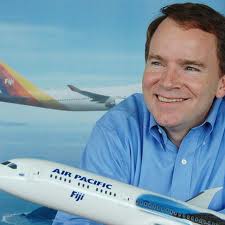
For its part, Qantas wants out and is trying to get the Fiji Government to buy its 46 per cent share – presumably to compete with gloves off in an all-out brawl. But Tourism Minister Aiyaz Sayed Khaiyum says Qantas’s asking price is too much and has accused the Flying Kangaroo of “being cute”. Things being the way they are in the airline business, there’s no other buyer on the horizon so the minister can presumably afford to wait. The irony, of course, is that the more Jetstar encroaches on Air Pacific’s business, the less the Qantas stake is likely to be worth. It evidently didn’t occur to Qantas to sell out before it put Jetstar on the Nadi route.
It’s a relationship almost as old as Air Pacific itself. Qantas first bought into Fiji Airways in 1958, adding its lustre to the local brand and strongly supporting it through the succeeding decades. But just as the Australian Government has become alienated from Fiji since Frank Bainimarama’s coup of 2006, so has the Flying Kangaroo. The two main shareholders in Air Pacific are now at loggerheads, with Qantas resentful that Fiji recently ended its effective right of veto on the local board. While Aiyaz Sayed Khaiyum cast this as Fiji asserting its legitimate sovereign right to control its own airline, Qantas muttered about a unilateral takeover that would damage future foreign investment in Fiji.
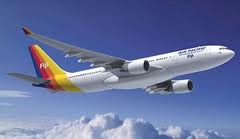
Air Pacific’s local critics are scornful of the name change, arguing that it’s merely a cosmetic makeover that doesn’t address their fundamental concerns. They’ve taken to Facebook with a range of complaints, including chronic delays, a general deterioration in the standards of service and penny pinching when it comes to catering. Grubsheet can attest to the fact that Air Pacific meals leave a lot to be desired. Yet undoubtedly that’s what happens when an airline tries to maintain “full service” against competitors who, in the case of Jetstar, even charge for water. Dave Pflieger is promising to gradually address these complaints as part of his overall strategy to revive the airline. Air Pacific/Fiji Airways passengers will say amen to that.
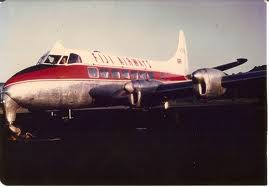
Since it was launched in 1951 as Katafaga Estates by the pioneering Australian aviator, Harold Gatty, the national airline has grown from a single Dragon Rapide into a vital lifeline for Fiji’s tourist industry, bringing in visitors by the plane-load from the far reaches of the Asia Pacific. It’s central to the well being of the national economy and every possible step needs to be taken to keep it competitive and afloat. If that involves becoming a low cost carrier itself – and charging its passengers extra for additional services and food – then so be it. Because the alternative is to be held hostage to foreign carriers who – as Fiji witnessed to its cost in 1987 –simply fly off and leave the country stranded whenever the going gets tough. Small airlines are endangered species and Air Pacific clearly has to do a lot more to earn the loyalty of its local customers. But they, in turn, need to embrace the new Fiji Airways in the same way they embrace those other Flying Fijians – the national rugby team – as symbols of national pride and a will to succeed.
This article has subsequently appeared in Pacific Scoop NZ.

Graham, I agree with you when you write that Fiji’s national airline is central to the well being of the national economy and every possible step needs to be taken to keep it competitive and afloat. Rebranding Air Pacific will be an expensive exercise so I hope the experiment proves worth it. Only time will tell. However I’m sure the Fijian travelling public will embrace Fiji Airways – provided of course they’re economically competitive.
This brings me to some of your other comments, the logic of which are puzzling. You claimed that Qantas were perverse in bringing their low cost carrier Jetstar to compete with an airline they have shares in. I’d say that the interim government was perverse since it gave Jetstar landing rights in Fiji when it probably wasn’t compelled to.
Although Fiji did lose the passing trade of several airlines in 1987, I would’ve thought that would work in the national airline’s favour by reducing competition. In any event, Jetstar’s arrival in Fiji after the 2006 coup and its presence here through the GFC seems to fly in the face of your premise, at least latterly.
You’ve written that Qantas is intent on driving Air Pacific to the wall. If this is the case then. since the interim government has already expressed an interest in buying Qantas’ shares, it will surely work in government’s favour since Air Pac shares will be reduced in value. In addition you seem to work from the premise that both airlines are competing for a bigger slice of the same-sized pie, which is contrary to government reports that tourism numbers have increased substantially over the past two years.
You wrote that Tourism Minister Sayed Khaiyum says Qantas’s asking price is too much and has accused the Flying Kangaroo of being cute. In fact a report in today’s Times has him stating that the airline made a loss of $93m in 2010. Yet in 2011 Air Pacific reported an after tax statutory profit of $24.7m. Things look as if they’re on the up and up, so I’d say he’s the one being cute in this context by referring to a historical year of loss.
Jon, in response to what you say is my puzzling logic:
1/ I’d imagine the Fiji Government had little choice but to admit Jetstar given the international access agreements that govern these things. After all, Qantas had rights that it wasn’t exercising.
2/ The fact remains that without its own airline, Fiji is at the whim of international carriers who can choose whether or not to utilise their traffic rights and withdraw.
3/ I’d imagine – given its aggressive tactics – that Qantas would be intent on driving Air Pacific to the wall AFTER it sells its stake not before. The notion of a bigger pie is surely moot. It’s about market share of whatever pie exists. On the Sydney route, three carriers are aggressively fighting for their share of that pie, whereas not so long ago, Air Pacific had the route all to itself.
4/ If Air Pacific is performing better well and good. It doesn’t alter the fact that it and similar airlines are up against the wall and are totally hostage to fuel prices and the state of the global economy.Your notion of Air Pac being on the “up and up” with a profit equivalent to $12-million US dollars is absurd. I’d say that’s line ball by any standard.
Graham, the colloquial expression ‘things are on the up and up’ means that things are improving. Therefore I’m not sure why you find my assertion ‘absurd’ since a one year turnaround from a $93m loss to a $24.7m profit is quite splendid by any method of calculating improvement.
Neither am I sure how you converted F$24.7m into US$12m since yesterday’s exchange rate has it at US$13.5m. It might not be much to you but even the Andersen and Andersen school of arithmetic would concede that’s US$1.5m to some poor bloke.
And herein lies the crux of the conundrum faced by the interim government. Qantas will naturally try to talk the value of Air Pacific up to obtain the best sale price. The government will try to do the reverse (probably by more than the paltry 12% you managed) yet at the same time, it’s faced with the converse need to present the national airline to the public as being a viable entity with ever improving future prospects.
This is going to be a difficult balancing act and I’m intrigued by how they propose to manage it. Nationalising the airline springs to mind, since that would eliminate the tiresome contractual need for an independent arbitrator to assess fair value.
Jon, raising the spectre of nationalisation shows how biased you are. No-one in government has ever suggested this.
Why, for the sake of F$70 million Fijian or so, would the government jeopardise any further foreign investment in Fiji? Why even canvass the notion except out of a desire to sow mischief?
Thanks for your lesson on Negotiation 101 and your brilliant deduction that this will be a “fine balancing act”. On this, at least, we can agree. Oh, and yes, the value of one and a half million dollars.
Graham, I don’t have any desire to sow mischief by expressing my opinion here, however biased you might feel it is. This is, after all, only a minor blog and hardly a place the great and the good will visit to gauge public opinion before determining what their next move should be.
If you feel that full government ownership of our national carrier would be a ‘spectre’ that would jeopardise further foreign investment in Fiji then you clearly don’t think much of this government’s ability to handle the possibility competently.
I agree that, if not handled correctly, nationalising might give potential investors pause for thought about going into partnership with government or quasi government organisations such as the FNPF, but you appear to have already prejudged the outcome of what is, at the moment, only a possibility.
However I haven’t forgotten that the interim government has already carried out a quasi nationalising of a development that is arguably worth more than the national airline. As you will recall the Momi decree gave FNPF complete ownership of a development that it was previously only a lender to.
Going by your pejorative use of the term ‘spectre’ in the context of nationalising, you were presumably against that decree – which would then imply that you feel it wasn’t made with the best long term interests of Fijians in mind.
Jon,
Welcome to the minor blog site but where else would you be???
Jon, you know as well as I do that nationalisation carries with it the connotation of the government unilaterally seizing the asset. So that clearly does have implications for future foreign investment.
Were the Fiji Government to buy the Qantas share in Air Pacific, clearly it would then own more than 97 per cent of the airline. But it has always said it intends to buy that share, not appropriate it.
Graham, nationalisation doesn’t just carry the ‘connotation’ of government unilaterally seizing an asset – that is its definition.
However your assertion that government ‘has always said it intends to buy that share, not appropriate it’ appears to indicate an important misunderstanding – that appropriation/ expropriation/ nationalisation, call it what you will – occurs without any payment to the subject party. This is not the case.
Compulsory buyback of shares happens regularly in many listed companies usually at the current market price. So ‘if’ it were to happen with the national airline, I see no reason why the same procedure would not be followed.
Your scaremongering about the ‘spectre’ of nationalisation doesn’t do anyone any good, least of all those of us who live and work in Fiji, since it implies that the assets are to be taken without compensation a la some Latin American or African military dictatorship. And that, as you say, would clearly have implications for future foreign investment.
Graham
People like jon orton will never agree to anything this government will do, never mine how good it is or it will benefit us the Fijian people.
Hi Graham,
I have been following your blog for some time and enjoy your work!
I find it really encouraging to read that some journalists are prepared to seekout and then stick with the truth, rather than take the easy road of publishing unsubstantiated and/or biased pieces.
I am seeking a journalist interested in revealing the truth about what the Australian government is trying to do to an Australian charity which wants to provide practical help through international aid projects in Fiji and other South Pacific countries.
This charity (of which I and my family are supporters here in Oz) is being attacked in the most outrageous manner. The authorities and mainstream media, based on the lies and deceit of one greedy and disgruntled former supporter, have done their best to destroy it’s reputation. Even now, when this muck-raker’s story has been exposed as a complete fabrication, the persecution continues!
And why should this matter to you?
Because the Fijian people are being robbed of the charity’s substantial assistance and I have the impression that you care about such things and may be interested in doing something to change the situation.
I could go on – and on… but rather, I would be grateful to speak (in person / phone / skype) with you. And yes, there’s plenty of evidence!
Please forgive me for posting this as a comment to the above article, but it was the only way I knew to contact you.
Thank you, Kathy
Hi Kathy,
You contact me at grahamdavis@grubstreet.com.au
Cheers,
GD
Very good debate all around everybody and good to have comments from people like John Orton to balance things up.May I just say that this name change by Air Pacific as Graham mentioned ” reaching out to its past ” is probably just one of these catch phrase going around in modern business called ” Innovation ” and like many businesses have discovered this phenomenon can be both rewarding and destructive.Lets hope in Fiji Airways case the former will eventuate but time will tell.But businesses like life sometimes you have to go backward to go forward and in sports no other team displays that better than the Fijian seven a side team and here in Victoria the sport of Aussie Rules is like that as well where you take the ball backwards,sideways,over the top,right banana,left banana kicks etc to go forward and thats just part of the action that makes the game spectacular to watch. I know you people north of the border will disagree !!But thats my point and Graham can I also contact you on your e mail there are some issues I would just want to discuss personally and may be you can write them for me
Just a correction on my posting above Graham that i should have said ” Buzz word instead of ” catchphrase ” in referring to Innovation and that Innovation comes with another buzz word in business ” risk ” and referring to my analogy of the Fijian sevens rugby team in that they are not scared of going backwards to go forwards.
Air Pacific is losing money. Even reverting to “Fiji Airways” might not work. Time to revert to the Samoan model – hook up with a bigger player and cut your costs. Polyblue / Virgin Samoa is doing well hehe
Thats another good thought Petelo.Its another business catchword known as leverage.Who knows Air Pacific/Fiji Airways might head down that way,only time will tell.And if it happens may be they should call it Fiji Blue !!!
Still on airlines though can you tell us which airline is making A LOT OF MONEY OR PROFITS now given the astronomical costs of aviation fuel and other high costs?